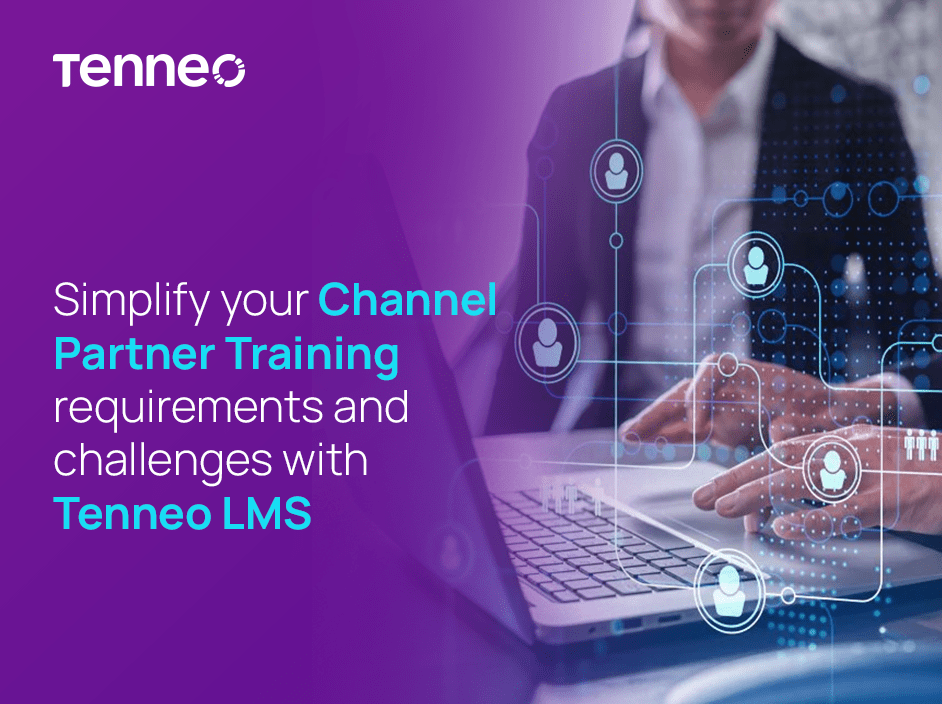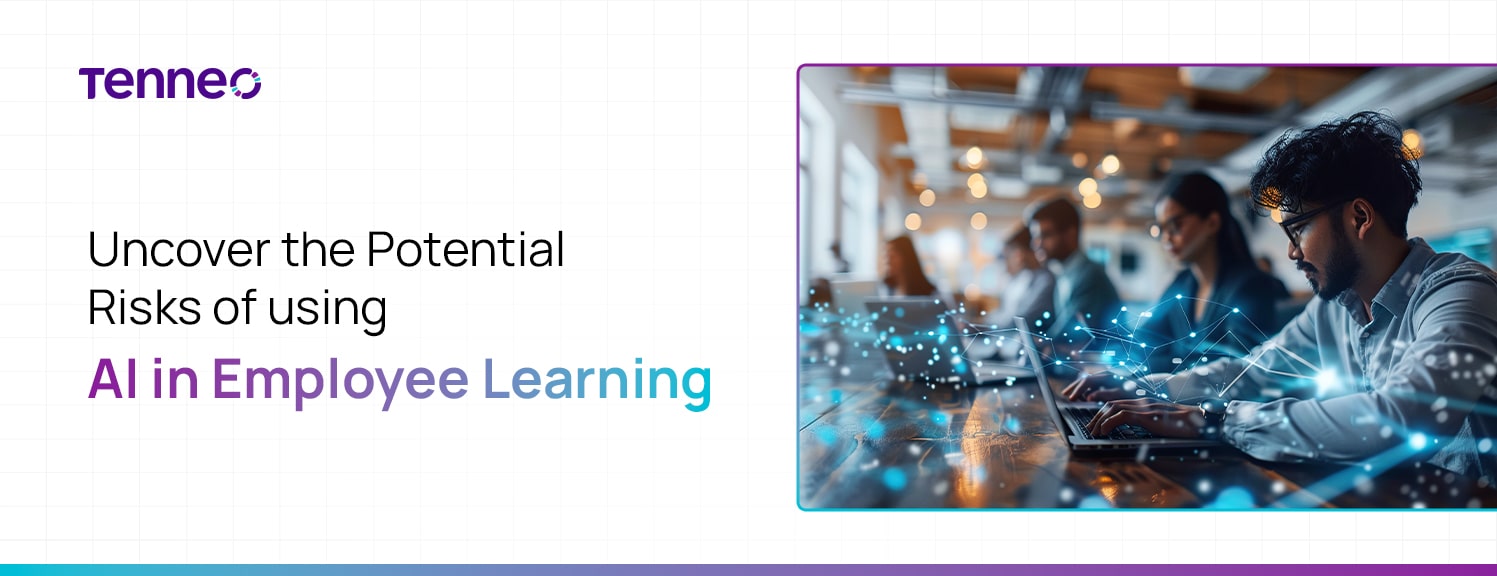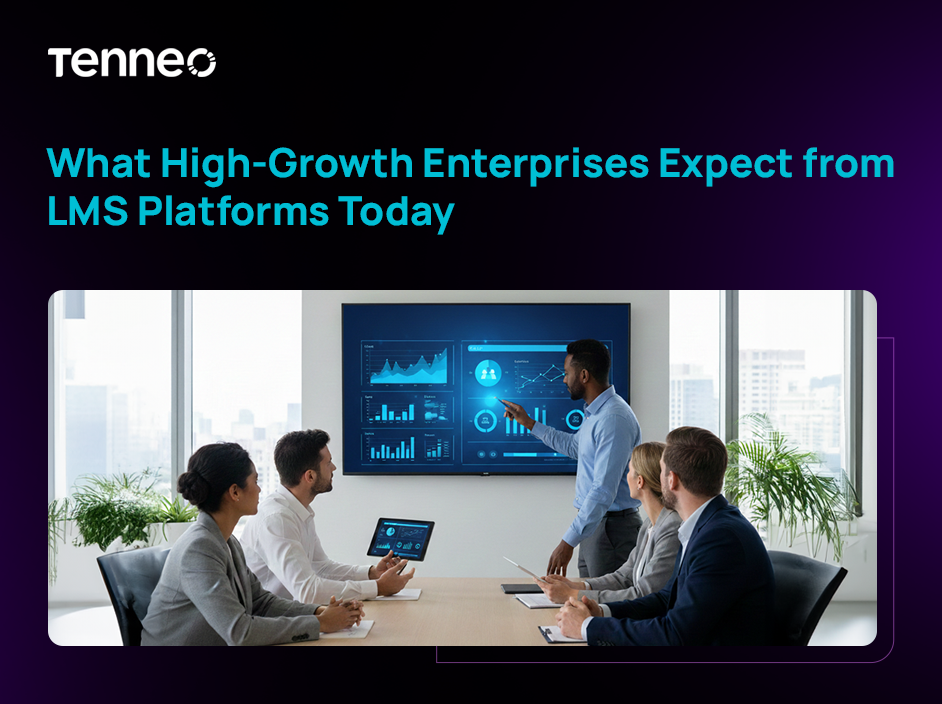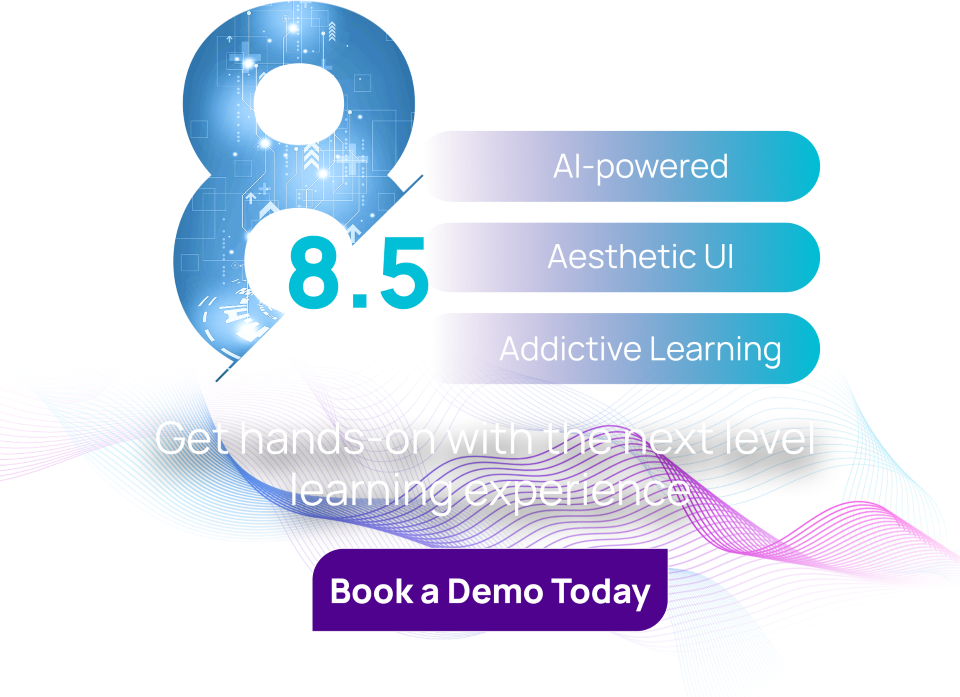
Overcoming the Blue-collar Workforce Learning Challenges
September 18, 2024
How does Tenneo simplify channel training?
March 22, 2024
Overcoming the Blue-collar Workforce Learning Challenges
September 18, 2024
How does Tenneo simplify channel training?
March 22, 20244 Areas Where AI In Employee Learning Can Go Wrong

AI in employee learning is often hailed as a game-changer. With its promise of personalized learning experiences and streamlined training processes, it’s easy to see why many organizations are eager to adopt AI-powered LMS solutions. However, before diving headfirst into the AI-driven learning revolution, it’s essential to understand the risks of AI in learning.
Imagine investing in an advanced AI-powered LMS only to encounter unexpected issues that undermine its potential. From ethical dilemmas to privacy concerns, AI in corporate learning can lead to certain employee training challenges that arise from AI limitations.
Where Can AI in Employee Learning Go Wrong
1. Ethical Dilemma
While 61% of employees are comfortable with being monitored, they want to be ensured that their data is being used ethically [1]. AI systems feed on data, and in the employee learning domain, the data often includes their personal information. This information, when accessed by the wrong hands, can lead to undesirable results. For instance, an AI-powered LMS leverages employee learning data to understand their learning patterns, preferences, and performance. However, the flip side of the coin is that this information can also lead to privacy invasions if it is not handled ethically.
Often, employees don't have complete transparency over how their personal information and learning data will be used. This lack of transparency can lead to ethical dilemmas, especially when decisions based on AI in employee learning affect promotions, job placements, or performance reviews.
2. Overreliance on Technology
The smart use of AI to automate and enhance various aspects of employee learning has been a revolution. However, the overreliance on AI-led automation in learning has also paved the path diminishing human element that is crucial for employee development. Research suggests that overreliance on AI in employee learning has decreased employees’ decision-making abilities by 27.7%. [2]
Technology can never replace human touch and collaboration of human intelligence. An AI-powered LMS can definitely provide tailored learning recommendations based on various metrics. However, it might fail to understand the true potential of a learner and stifle their critical thinking and problem-solving skills. This can lead to a passive learning culture, where the richness of human interaction and collaborative learning is lost.
3. Privacy & Security Concerns
AI in corporate learning systems store, access, and analyze huge chunks of employee data - from learning history and performance metrics to behavioral insights. If these platforms lack robust security measures, they can become targets for cyberattacks, leading to unauthorized access and severe privacy violations. In 2023, 53% of organizations acknowledged the relationship between Gen AI and cybersecurity risks. [3]
Additionally, ineffective data security could lead to data breaches and to unintended consequences such as identity theft or discriminatory practices.
4. Misinterpretation of Performance
AI in corporate learning systems is typically designed to quantify performance based on assessment scores, completion rates, and time spent on training activities. While analyzing these metrics, AI-driven learning platforms fails to consider the qualitative aspect of employee growth. 90% of HR heads believe their current AI performance management system fails to yield accurate information. [4]
The AI limitations come to light while assessing interpersonal skills, emotional intelligence, or leadership potential. This results in misinterpretation of critical soft skills that can affect an employee's growth pathway.
These concerns can indeed seem daunting and might even make you hesitant about adopting AI in employee learning. However, at Tenneo, we have proactively addressed these issues to ensure our AI-powered LMS enhances your learning strategy while safeguarding your organization’s interests.
How Tenneo LMS Helps You Overcome These Hurdles
1. Stringent Data Privacy Measures
At Tenneo, we understand that data privacy, trust and ethical use of AI is crucial for employee learning success. Our LMS is designed in adherence to stringent data protection regulations such as GDPR and other relevant global standards. Our AI algorithms are built with transparency and accountability in mind, ensuring that personal data is used responsibly and with explicit consent.
Moreover, Tenneo LMS includes comprehensive data governance frameworks that allow organizations to manage and audit how employee data is collected, stored, and used. By doing so, Tenneo LMS helps organizations build and maintain trust with their employees.
2. Collaborative Learning Mechanism
Tenneo LMS thrives on AI capabilities but doesn't compromise the importance of human collaboration and intelligence. Our AI-powered training platform incorporates robust collaborative learning features that foster critical thinking and human interaction. It offers discussion forums, social walls, and learning communities where employees can engage in meaningful dialogues, share insights, and develop problem-solving skills.
Additionally, Tenneo LMS provides tools that allow learners to co-create content, participate in peer reviews, and collaborate on projects, ensuring that the learning experience remains dynamic and human-centric. This approach prevents the overreliance on technology and builds a culture of active learning and collaboration within the organization.
3. Encryption Protocols and Access Controls
Security is a top priority for Tenneo LMS, particularly when it comes to handling sensitive employee data. Our platform is equipped with advanced encryption protocols that protect data, ensuring that employee information is secure from unauthorized access. We also offer granular access controls that allow organizations to define user permissions and restrict access to sensitive data based on roles and responsibilities.
These measures not only protect the privacy of employee data but also ensure compliance with regulatory requirements, giving organizations peace of mind when using AI-powered training solutions.
4. Natural Language Processing Algorithms & Soft Skills Training
To address the employee training challenges of misinterpreting performance data, Tenneo LMS integrates advanced Natural Language Processing (NLP) algorithms that analyze qualitative feedback alongside quantitative metrics. These NLP algorithms are capable of understanding context, sentiment, and nuance, providing a more accurate and holistic view of employee performance.
In addition to NLP, Tenneo LMS offers specialized modules for soft skills training and assessments. It includes AI-powered training video analysis tools that evaluate expressions, voice tone, and body language. These tools are designed to assess interpersonal skills and emotional intelligence, ensuring that these critical aspects of performance are recognized and nurtured . By combining AI with human insight, Tenneo LMS provides a balanced approach to employee assessment, ensuring that all dimensions of performance are valued.
Conclusion
While AI in employee learning holds immense potential, it’s crucial to address its challenges to truly harness its benefits. By focusing on ethical data use, preventing overreliance, ensuring privacy, and accurately interpreting performance, organizations can overcome these hurdles.
Tenneo's AI-powered LMS is built to tackle these concerns. Our learning solutions are designed to overcome the common pitfalls of AI limitations, ensuring privacy, and fostering critical thinking.
Talk to our experts and understand how you can leverage Tenneo LMS to unlock the full potential of AI and drive impactful learning outcomes. https://tenneo.com/contact-us/
Join the LearnTech Revolution. Join the Tenneo Community.
References for statistics used:
[1] 360learning
[2] Research Gate
[3] Forbes
[4] PeopleHum




